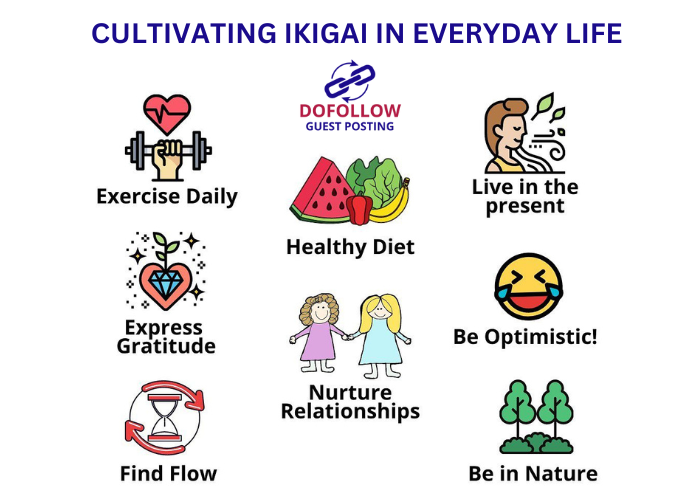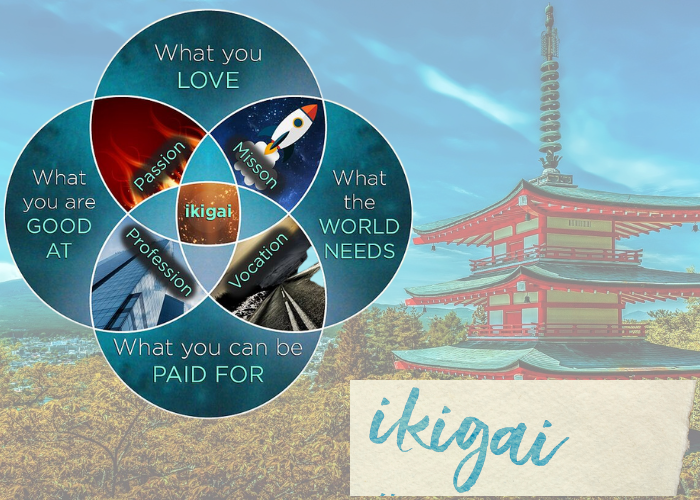Outline of the Article:
- Introduction
- What is Ikigai?
- The Origins of Ikigai
- Discovering Your Ikigai
- Identifying Your Passions and Interests
- Recognizing Your Skills and Talents
- Finding What the World Needs
- Reflecting on What You Can Be Paid for
- The Benefits of Living Your Ikigai
- Increased Happiness and Fulfillment
- Improved Health and Well-being
- Enhanced Motivation and Productivity
- Stronger Sense of Purpose
- Examples of Ikigai in Practice
- Overcoming Challenges in Pursuing Ikigai
- Fear of Change and Failure
- Social and Cultural Pressures
- Prioritizing Responsibilities and Obligations
- Cultivating Ikigai in Everyday Life
- Setting Meaningful Goals
- Embracing Mindfulness and Gratitude
- Nurturing Relationships and Connections
- Engaging in Continuous Learning and Growth
- Conclusion
- FAQs (5 unique questions)
Finding Your Ikigai
Introduction
In the hustle and bustle of our daily lives, it’s easy to lose sight of what truly brings us joy and fulfillment. Many of us find ourselves caught in the monotony of routine, longing for a deeper sense of purpose. This is where the concept of ikigai comes into play. In this article, we will explore the meaning of ikigai, its origins, and how you can discover your own ikigai to lead a more meaningful and satisfying life.
What is Ikigai?
Ikigai, a Japanese term, translates to “reason for being” or “the joy of living.” It represents the intersection of four essential elements: what you love, what you are good at, what the world needs, and what you can be paid for. It is the sweet spot where passion, mission, vocation, and profession converge, creating a sense of purpose and fulfillment.
The Origins of Ikigai
The origins of ikigai can be traced back to the Japanese island of Okinawa, known for its high life expectancy and healthy aging population. The concept emerged from observing the longevity and well-being of the Okinawan people, who often attribute their health and happiness to living with a strong sense of ikigai.
Discovering Your Ikigai
- Identifying Your Passions and Interests: Take time to reflect on the activities and hobbies that ignite a sense of joy and excitement within you. What makes you lose track of time? What brings you a deep sense of satisfaction?
- Recognizing Your Skills and Talents: Assess your strengths and areas of expertise. What are you naturally good at? What skills have you developed over the years? Recognizing your talents can help you find alignment with your ikigai.
- Finding What the World Needs: Consider the needs and problems present in your community or the world at large. How can you contribute to making a positive impact? Identify ways in which your passions and skills can be utilized to address these needs.
- Reflecting on What You Can Be Paid for: While it’s important to find purpose in what you do, sustaining a livelihood is also crucial. Explore opportunities where your passions, skills, and the market demand intersect.
The Benefits of Living Your Ikigai
Living in alignment with your ikigai can bring about numerous benefits that go beyond mere satisfaction:
- Increased Happiness and Fulfillment: When you engage in activities that align with your passions and values, it naturally leads to a greater sense of joy and fulfillment.
- Improved Health and Well-being: Living with purpose has been linked to lower stress levels, reduced risk of certain health conditions, and overall better physical and mental well-being.
- Enhanced Motivation and Productivity: Having a clear sense of purpose provides the motivation and drive to pursue your goals with enthusiasm and dedication, resulting in increased productivity.
- Stronger Sense of Purpose: Ikigai gives your life meaning and direction, helping you navigate challenges and setbacks with resilience and determination.
Examples of Ikigai in Practice
Numerous examples illustrate the power of ikigai in various fields. Take, for instance, a teacher who is passionate about education, possesses excellent communication skills, sees a need for educational reform, and earns a living by inspiring young minds. Their work brings together all elements of their ikigai, resulting in a fulfilling career.
Overcoming Challenges in Pursuing Ikigai
While pursuing your ikigai can be immensely rewarding, it is not without its challenges. Here are some common obstacles and how to overcome them:
- Fear of Change and Failure: Embracing change and understanding that failure is an integral part of the growth process can help you overcome the fear that holds you back from pursuing your ikigai.
- Social and Cultural Pressures: Societal norms and expectations may discourage you from following your passions. Surround yourself with supportive individuals who understand and encourage your pursuit of ikigai.
- Prioritizing Responsibilities and Obligations: Balancing responsibilities and pursuing your passions can be challenging. Start by incorporating small actions aligned with your ikigai into your routine and gradually increase your commitment over time.
Cultivating Ikigai in Everyday Life

- Setting Meaningful Goals: Define clear goals that align with your ikigai and break them down into actionable steps. Regularly review and adjust your goals to stay on track.
- Embracing Mindfulness and Gratitude: Practice being present in the moment and cultivate gratitude for the blessings in your life. This helps you appreciate the journey towards finding your ikigai.
- Nurturing Relationships and Connections: Surround yourself with like-minded individuals who inspire and support your pursuit of ikigai. Build meaningful relationships and collaborate with others who share similar values.
- Engaging in Continuous Learning and Growth: Embrace opportunities for learning and personal development. Seek new experiences and acquire new skills that contribute to your ikigai journey.
Conclusion
Finding your ikigai is a transformative process that allows you to discover and live a life filled with purpose and fulfillment. By identifying your passions, recognizing your skills, addressing the needs of the world, and finding avenues where you can be paid, you can create a life that resonates deeply with your values and aspirations. Embrace the journey of self-discovery and unlock the joy of living your ikigai.
FAQs
1. How long does it take to find your ikigai?
The time it takes to find your ikigai varies for each individual. It is a process of self-discovery that can unfold over time. Some people may have a clear sense of their ikigai early on, while others may take longer to explore and uncover their true passions and purpose.
2. Can I have more than one ikigai?
Yes, it is possible to have multiple ikigai in different areas of your life. Each aspect of your life, such as career, relationships, hobbies, and personal growth, can have its own unique ikigai. The key is to find balance and ensure that all areas contribute to your overall sense of fulfillment.
3. What if my current job doesn’t align with my ikigai?
If your current job doesn’t align with your ikigai, consider exploring opportunities to integrate elements of your ikigai into your work. This could involve taking on new projects, seeking additional responsibilities, or even considering a career transition that aligns more closely with your passions and purpose.
4. How can I stay motivated on my ikigai journey?
Maintaining motivation on your ikigai journey can be supported by setting meaningful goals, celebrating small victories along the way, seeking support from like-minded individuals, and regularly reminding yourself of the impact your ikigai has on your life and the lives of others.
5. Can my ikigai change over time?
Yes, your ikigai can evolve and change over time as you grow, gain new experiences, and gain further clarity about what truly brings you fulfillment. It’s essential to periodically reassess and realign your ikigai with your current aspirations and values.



